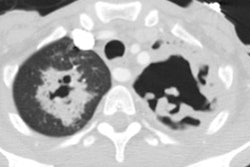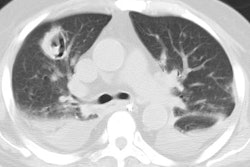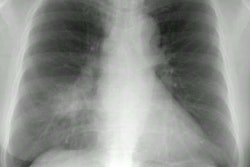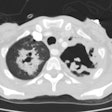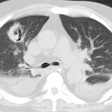AJR Am J Roentgenol 1997 Apr;168(4):1005-1009. Pulmonary tuberculosis in children: evaluation with CT.
Kim WS, Moon WK, Kim IO, Lee HJ, Im JG, Yeon KM, Han MC
OBJECTIVE: The purpose of our study was to describe the CT findings of pulmonary tuberculosis in children and to define indications for the use of CT. MATERIALS AND METHODS: CT findings in 41 consecutive children with confirmed tuberculosis were retrospectively analyzed by two radiologists. Chest radiographs and medical records were also reviewed to determine whether additional information provided by CT scans had altered clinical management of the disease. RESULTS: Mediastinal and hilar lymphadenopathy was seen in 34 patients (83%). In 29 of these patients, enlarged nodes had low-attenuation centers and enhancing rims. In the five other patients, enlarged nodes had calcification. Segmental (n = 12) or lobar (n = 8) air space consolidation was seen in 20 patients (49%), nodules of bronchogenic spread were seen in 12 patients (29%), and miliary nodules were seen in seven patients (17%). Bronchial (n = 15), pleural (n = 7), pericardiac (n = 1), or chest wall (n = 1) complications of tuberculosis were seen in 22 patients (54%). In eight (20%) of 41 patients, a diagnosis of tuberculosis was suggested only on CT scans, which revealed low-attenuation nodes with rim enhancement, calcifications, and nodules of bronchogenic spread or miliary nodules. These findings were not seen on chest radiographs. In 15 patients (37%), CT scans provided information that altered clinical management. Also two of these patients underwent surgery because of pleural and chest wall complications that were seen only on CT scans. CONCLUSION: Mediastinal or hilar lymphadenopathy revealed as low-attenuation nodes with rim enhancement or calcification was the most characteristic CT finding of pulmonary tuberculosis in children. CT can be useful when tuberculosis or its complications are suspected in children and the radiographic findings are normal or inconclusive.
PMID: 9124105, MUID: 97243325
